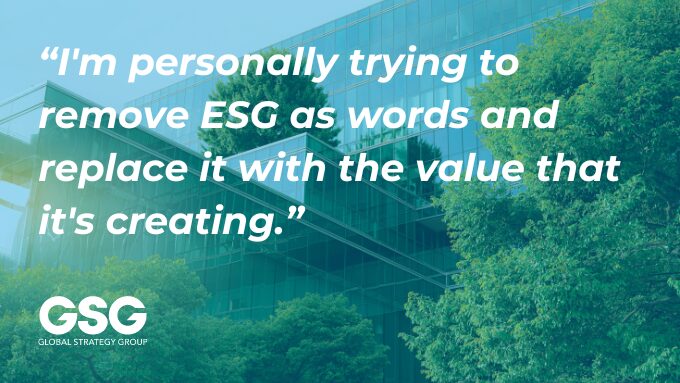
As social impact communicators, it’s our job to stay up to date on current ESG trends and share best practices for navigating the challenges and opportunities. As such, we might take for granted the existence and implementation of ESG policies across organizations, within boardrooms, and in legislative bodies. However, as we’ve seen with previous movements to adopt more responsible business practices, such as consumer safety and diversity within leadership ranks at companies, these policies are likely to face backlash.
This month’s issue of The Goods explores the current ESG climate and its future direction to help us all stay one step ahead and position organizations to inoculate against criticism and focus on achieving their social impact goals.
The Goods is a newsletter for social impact communicators that helps you keep track of the latest updates, trends, industry best practices, and much more. This content is compiled and curated monthly by Jade Floyd, Victoria Dellacava, and Mia Saponara.
GSG’s ESG Roundtable Recap

GSG has tracked the relationship between companies and social responsibility for almost a decade. Last month, GSG Executive Vice President Jade Floyd and Senior Vice President Arielle Confino convened a group of high-level executives from prominent organizations, all grappling with ESG-related issues, for a closed-door roundtable conversation. The conversation made clear that while executive teams, employees, and consumers all see ESG as a priority, it is also a challenge to navigate the political headwinds that threaten ESG policies.
Concern about the “branding” of ESG dominated the conversation, with several executives voicing concern about conservative criticisms that label social impact policies as “woke” politics. Participants also highlighted how their organizations are navigating an environment that is increasingly hostile to ESG. Solutions mirrored GSG’s research which found that by focusing on ESG’s benefits—increasing revenue, reducing risk, empowering employees, and attracting consumers—organizations can transcend the controversies of the nomenclature.
Check out the full roundtable recap to learn more about the valuable insights that came out of the conversation, as well as get a full overview of GSG’s research into the term that has become a lightning rod.
Despite Backlash, Sustainability Remains a Priority
Despite ESG becoming a recent victim of the right-wing culture war, most executives globally have doubled down on their organizations’ long-term sustainability policies. A recent survey from EY finds that sustainability and climate issues are moving back into focus for senior executives.
EY surveyed 1,200 CEOs and 300 institutional investors in 21 countries, and the results are clear—sustainability is an increasingly prominent issue. Some key findings from the research:
- More than half of CEOs (54%) report that sustainability is a higher priority for their organization than it was 12 months ago, indicating a resurgence in executive interest in the policy.
- Respondents in the Americas were the most likely to report that sustainability has become a higher priority, compared to Europe and the Asia-Pacific region.
- Decarbonization is the top long-term strategic priority for CEOs.
Navigating Anti-ESG Backlash
From congressional hearings, lawsuits, and anti-ESG legislation in conservative states, executives and organizations are asking the question: “Is engaging in ESG even worth it?”
Our data shows time and time again, that yes, it is. GSG and SEC Newgate’s ESG Monitor found that 60% of consumers agree that companies should speak up when it comes to issues that are important to their employees and customers, and that 72% of Americans believe it is important for companies to act on ESG issues.
So, what can you do to avoid backlash as your organization engages in ESG work? Be thoughtful and strategic about the ESG initiatives your organization engages in:
- Align your sustainability storytelling with your business growth and marketing strategy. If your communications are tightly aligned with the strategic decisions of your business, executives have an evidence-based rationale to reference in the face of backlash. (This applies to all three pillars of ESG.)
- Conduct a robust materiality analysis to understand what ESG issues are important to your stakeholders. When your ESG programs are tied to a goal that addresses a material issue affecting your business strategy, your organization has a proof point and justification for ESG strategy.
(GreenBiz)
New From GSG

GSG Political: Global Strategy Group’s research practice
Looking for the latest political insights and data as we inch closer to November? We’ve launched a new microsite and social media channels where our expert team of dedicated strategists will bring you our latest reports, insights, and news from across the electoral map as we work to advance progressive causes and help Democrats WIN.
Visit and follow our newly launched X (Twitter) and LinkedIn channels where we’ll share findings on many issues – the fight for abortion rights, climate action, gun violence prevention, racial justice and equity, better immigration policies, LGBTQ+ rights, voting rights and democracy protection, and more.
To learn more about GSG Political, our clients, our team, and what sets us apart, visit our website: GSGPolitical.com. Interested in speaking with our experts or learning more about our research? Please get in touch!
Did we tell you something good? Share with a friend.